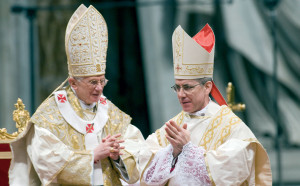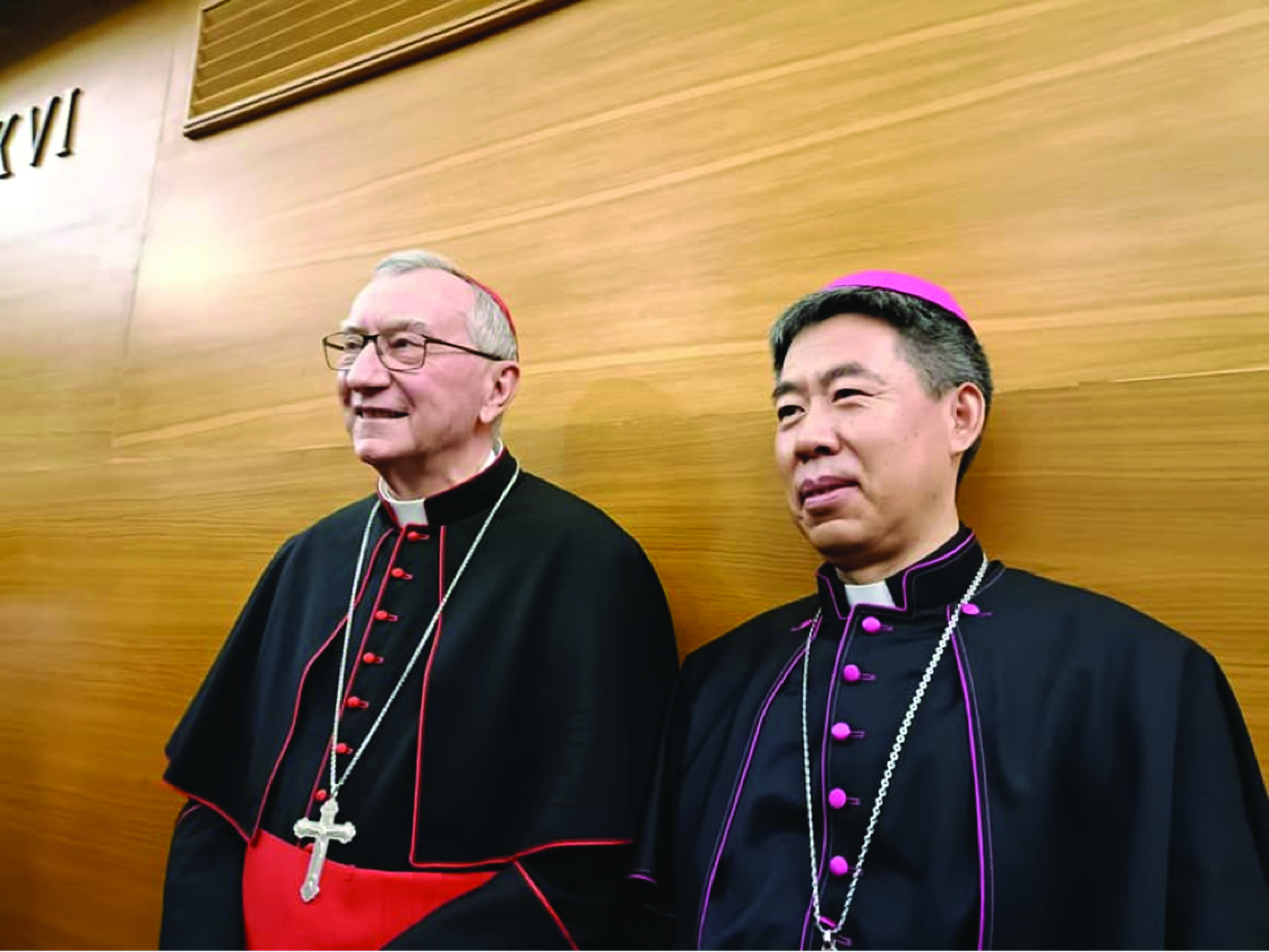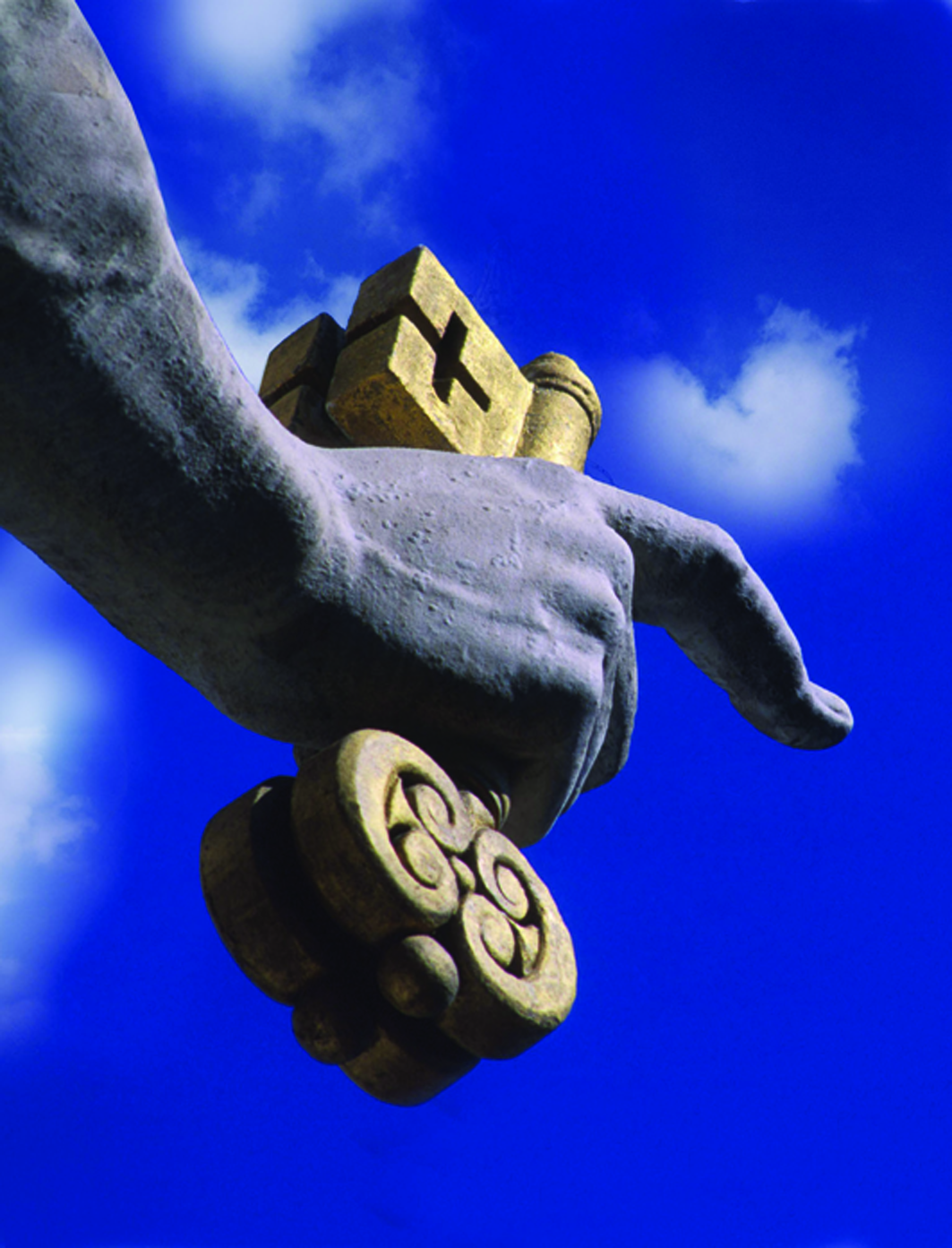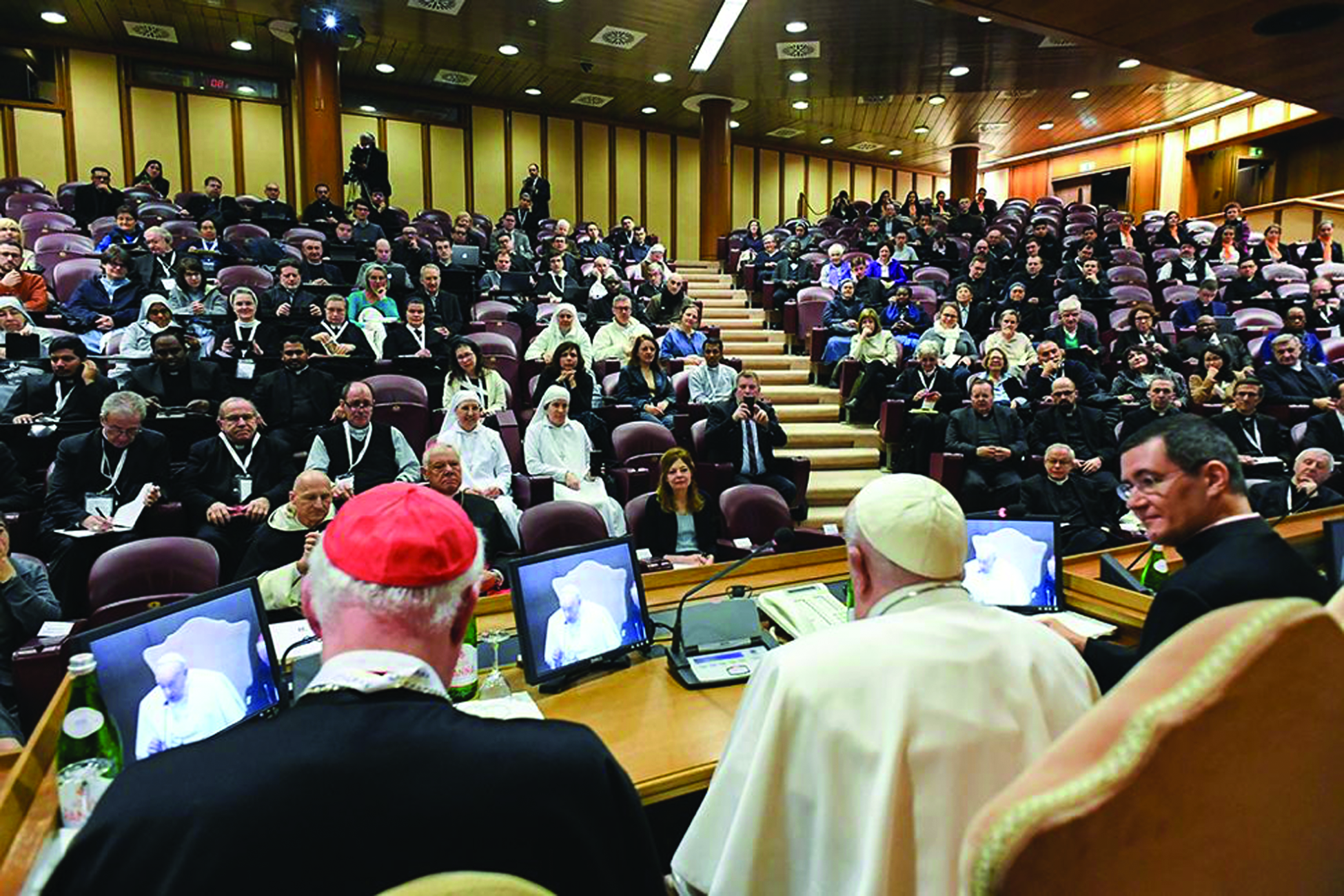Brothers and sisters in Christ, it is an honor and a joy for me to celebrate Holy Mass with you this morning here in this historic Pro-cathedral. I am deeply grateful to Archbishop Diarmuid Martin for his kind invitation and for his very gracious welcome. I would like to begin by thanking the priests, as well as the men and women religious here today, and the many members of different Catholic organizations and associations. In a particular way, I am grateful for the presence of representatives of other Christian communities. I thank the representative of the Lord Mayor for coming and the members of the diplomatic community, my colleagues. I am appreciative also of the presence of a representative of the government of Ireland, officials from the Department of Foreign Affairs and Trade, and all the other public authorities here present. Thank you for welcoming me.
This Mass is my first public celebration of the Church’s liturgy since I was received by the president of Ireland last Thursday, and delivered to him the Letter from Pope Benedict XVI appointing me as nuncio — which is the first public act of any new ambassador. I was grateful for the very warm welcome accorded me by the president and by the members of the government who were there with him.
Having presented my credentials to the president, I must say that I can think of no better way of marking the beginning of my service in this country than by celebrating Mass in this place, the Pro-cathedral of this diverse and dynamic Archdiocese.
I stand before you this morning as someone who represents various realities: I am the descendant of men and women of Ireland, who emigrated from this island possessing little more than the treasure of their Catholic faith, which they, through the generations, have passed on to me. Were it not for the faith of Ireland, I would not be a Catholic today.
I am someone who worked for many years in the Roman Curia, the central administration of the Catholic Church, where I had the privilege of working with Cardinal Joseph Ratzinger, now Pope Benedict XVI.
I am a newly-ordained bishop of the Catholic Church, and as such, with all my limitations and defects, a successor of the Apostles.
This morning, however, I stand before you principally as the representative of the Bishop of Rome, the successor of the Apostle Peter, Pope Benedict XVI. In his name, I greet you all and I bring you his best wishes for all the people of Ireland, for the government, and all the members of the diplomatic community.
As I mentioned, I have worked for many years very closely with the Holy Father and I can tell you from my personal experience that he has always had — and he continues to have — a great love for the people of Ireland and a high regard for the Catholic Church in Ireland, with its history of missionary richness and tenacious faith.

Archbishop Charles J. Brown, the new apostolic nuncio to Ireland, near Pope Benedict XVI
during the former’s episcopal ordination at a Mass marking the feast of the Epiphany in
St. Peter’s Basilica at the Vatican January 6 (CNS photo)
Pope Benedict knows as well that these recent years have been difficult for Catholic believers in Ireland. Again I speak from my own experience when I tell you that Pope Benedict was scandalized and dismayed as he learned about the tragedy of abuse perpetrated by some members of the clergy and of religious congregations. He felt deeply the wounds of those who had been harmed and who so often had not been listened to. From the beginning, Pope Benedict was resolute and determined to put into place changes which would give the Church the ability to deal more effectively with those who abuse trust, as well as to provide the necessary assistance to those who had been victimized. Pope Benedict has been relentless and consistent on this front, and I assure you that he will continue to be.
In our Gospel for today’s Mass, Jesus encounters a paralyzed man who is brought to him in Capernaum. The friends or family of this man bring him to Jesus in order to be healed physically. Indeed, they go to great trouble in carrying their friend to Jesus, lowering him down from the open roof above. Yet the curious thing about this miracle story is that Jesus does not heal the man from his paralysis in his first exchange with him. Instead, he says to him: “My child, your sins are forgiven.” The scribes who were present take exception to these words of the Lord. They accuse him of blasphemy, because only God can forgive sins.
The Lord is aware of their thoughts (as he is aware of ours), and says to his critics: “But to prove to you that the Son of Man has authority on earth to forgive sins,” he turns to the paralytic and says: “I order you, get up, pick up your stretcher and go off home.” At that moment the paralyzed man stands up, picks up his stretcher and leaves the house, walking through the crowd.
Pope Benedict himself commented on this Gospel passage during his Angelus talk in February 2009, and he explained that this “Gospel account shows that Jesus has the power not only to heal a sick body but also to forgive sins; indeed, the physical recovery is a sign of the spiritual healing that his forgiveness produces. Sin is effectively a sort of paralysis of the spirit from which only the power of God’s merciful love can set us free, allowing us to rise again and continue on the path of goodness.”
The reality of physical paralysis is used by the Lord as a way of teaching us what sin (which we can understand as separation from God or as rejection of God’s path for us) does to the human person. It is not the case at all that Jesus is saying that the physical paralysis of the man before him was caused by that man’s sin; instead, paralysis and subsequent healing become visible signs of the invisible reality of the effects of the Lord’s grace in our lives.
Sin should not be understood primarily as a breaking of a rule or as violating the regulations. Sin is not, in the first instance, something legal. Sin is better understood as separating ourselves from God, who is life itself, or rejecting God’s path for us, the path that gives us life and grace, spiritual energy.
And so, paralysis becomes an appropriate visual symbol of the spiritual state produced by sin, by this separation from God.
Sin, of course, primarily affects individuals. It is a spiritual disease which afflicts us, which can paralyze us.
It is the encounter with Christ which begins to heal us of this infirmity, and that encounter, for us, takes place in his Church, which is his Body, through our proper and fruitful reception of the sacraments, principally the Holy Eucharist. One of the most ancient texts of the Church, written just several decades after the death and resurrection of the Lord, the Letter of St. Ignatius of Antioch to the Ephesians, speaks of the Holy Eucharist as medicine, “the medicine of immortality.”
But this separation from God or this rejection of the kind of life that he proposes for us is not only a reality that affects us as individuals. It also affects our relationships with others and the wider community. The Church herself is wounded by the sins of her members.
And just as sin produces a kind of spiritual paralysis in the individual, a radical lack of the spiritual energy which is grace, so too there can be a kind of spiritual paralysis in sections of the Church, where that energy seems to have disappeared, enthusiasm is dissipated, liturgical life grows cold. When this happens in the Church, in a certain sense, we need to do exactly what an individual does — come again into the presence of the Lord, of Christ himself, so that he can heal and restore us to life. The Church, my friends, does not live because of offices, committees and structures (as important as these may be). She lives by the presence of Jesus Christ — our way, our truth and our life. And his presence is experienced in many ways, but most powerfully in his word and in his sacraments — above all, in the sacrament of the Holy Eucharist.
We need to deepen our understanding of this reality and this is the reason for the important gathering which will soon take place “close to home,” we might say — here in the cosmopolitan city of Dublin. I refer, of course, to the upcoming International Eucharistic Congress which will be held from June 10th to the 17th of this year, a very significant event not only for the Catholic Church in Ireland, but for the universal Church. It has been carefully and creatively organized and prepared.
What is the point of such a gathering? It is to renew our faith in the reality which is at the absolute center of Catholic life – the real presence of Christ himself in the Eucharist. Ultimately, it is renewed faith and love for the Lord in the Eucharist that will renew our lives and renew the life of the Church. It is his true presence in the Eucharist which can heal our own spiritual paralysis, which fills us with light and joy, which gives meaning to our lives, and which prepares us for the life of the world to come.
It is a great joy for me to be in Ireland, beginning my time here as Pope Benedict’s representative, especially in this year of the International Eucharistic Congress. Something new is indeed happening. I am convinced that the Lord is preparing something beautiful for his Church. May I ask your support and your prayers for my mission, as I thank you from the heart for being here with me today. Let us ask the Blessed Virgin Mary, the Mother of God, to intercede for us and for Ireland as we strive to follow her Son more closely.






Facebook Comments